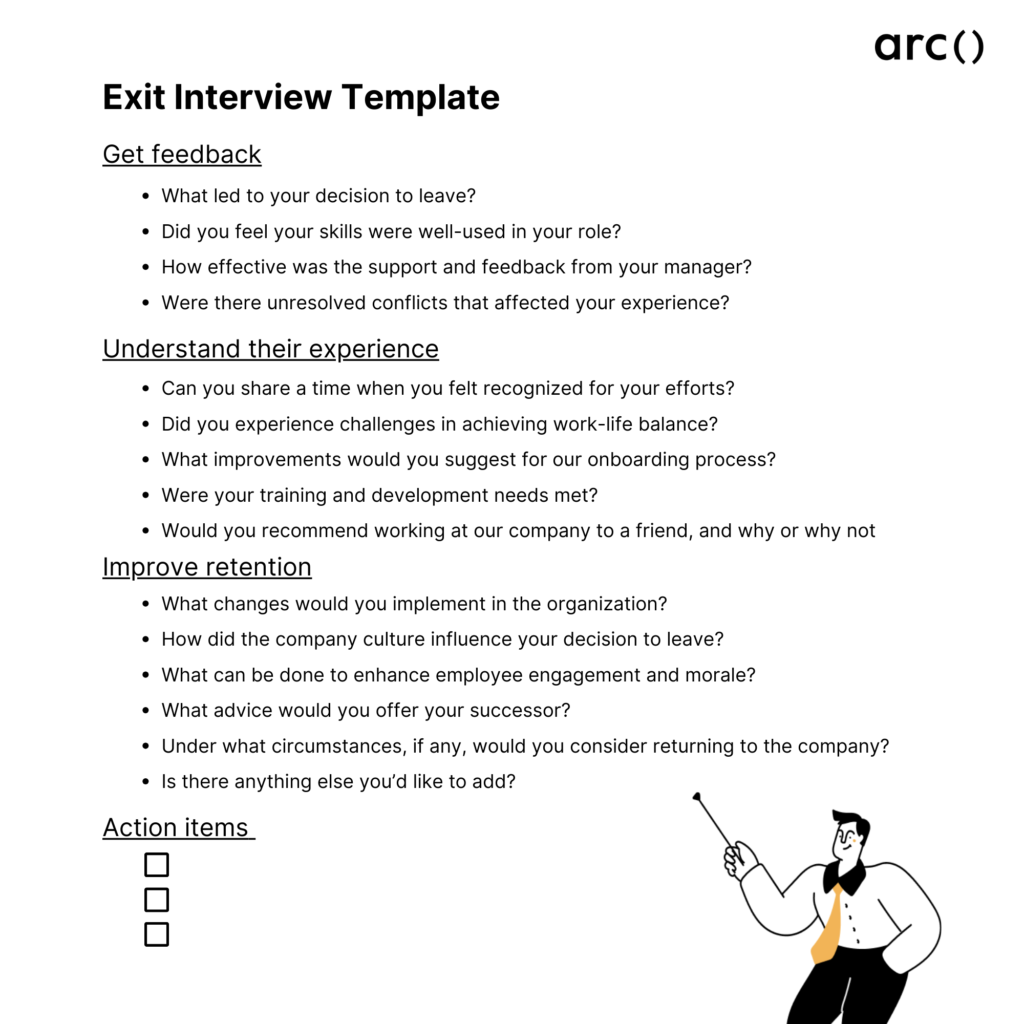When an employee leaves, it’s important to do an exit interview to learn from their experiences. These interviews are crucial for uncovering reasons behind departures and making informed improvements to enhance your organization.
Asking the right questions during an exit interview can help gather valuable information for both the departing employee and the company. By understanding why employees decide to leave, you can make strategic improvements to foster a thriving workplace.
This article will give you an exit interview template and offboarding process to ensure a smooth transition.
You can also try Arc, your shortcut to the world’s best remote talent:
⚡️ Access 450,000 top developers, designers, and marketers
⚡️ Vetted and ready to interview
⚡️ Freelance or full-time
Try Arc and hire top talent now →
Why exit interviews are crucial
Exit interviews offer a unique chance to gather feedback from the exiting employee, helping to pinpoint what might have gone wrong. In fact, this process not only shows that you value their input but also improves employee retention by addressing their concerns.
Here’s why exit interviews are beneficial:
- Uncover hidden issues: They reveal underlying problems, allowing you to address employee satisfaction proactively.
- Gather feedback: Direct insights on policies and culture from employees can spotlight opportunities for positive changes.
- Improve retention: Addressing issues that surface during exit interviews can reduce turnover and associated costs.
- Ensure positive departures: They allow departing employees to share their thoughts, enhancing their final impression of the company.
- Boost referrals: Positive departures often lead to personal recommendations and the possibility of rehiring former employees.
Your organization can improve retention rates by addressing these concerns. This will also ensure positive departures and increase the chances of future referrals and returns.
Asking effective exit interview questions
Balance is key when creating exit interview questions. However, knowing the best exit interview questions to ask can be a challenge.
Open-ended questions allow departing employees to give honest feedback, while targeted questions can pinpoint areas for improvement. Combine both to gain comprehensive feedback.
Here are a few tips for conducting exit interviews:
- Show empathy and listen. Make sure the employee leaving feels comfortable and appreciated during the conversation.
- Ask about their experience. Find out if they were happy with their job and if they had chances to grow. This can help you learn a lot.
- Discover the reasons for their departure. Determine if they left for better opportunities, higher pay, or improved work-life balance.
- Get direct feedback. Ask for suggestions on how the company can make things better for both current and future employees.
- Identify your organization’s strengths. Talk about what the organization values most to further strengthen these positive aspects.
To get honest feedback from employees, use a mix of open-ended and specific questions in exit interviews. Follow these tips for successful exit interviews.
Read More: YC-backed Pathrise hires top-performing engineer through Arc, onboards talent in 6 days
15 essential questions for your exit interview
Now that we know how important exit interviews are, let’s look at the questions that can give us helpful information during offboarding. Divide your questions into categories such as probing, behavioral, and future-oriented, to get comprehensive insights:
Probing questions: Get valuable feedback
Exit interviews with probing questions help you gather feedback, improve operations and, ultimately, retain top talent in your organization.
- What led to your decision to leave?
- Did you feel your skills were well-used in your role?
- How effective was the support and feedback from your manager?
- Were there unresolved conflicts that affected your experience?
Understanding why an employee has resigned helps us identify areas for improvement, such as job satisfaction and management quality. These factors can impact how engaged and committed employees are to the organization. They also reveal internal issues affecting employee engagement and retention because of management and mentorship quality.
Behavioral questions: Understand their experience
You can assess employee job satisfaction and happiness by asking these questions, which will help you understand what may be impacting the company’s reputation and ability to attract new hires.
- Can you share a time when you felt recognized for your efforts?
- Did you experience challenges in achieving work-life balance?
- What improvements would you suggest for our onboarding process?
- Were your training and development needs met?
- Would you recommend working at our company to a friend, and why or why not?
These questions are helpful for exit interviews as they evaluate key aspects of employee satisfaction. They help identify the effectiveness of recognition programs, work-life balance, training, and the company’s onboarding process.
Future-oriented questions: Improve retention
Insights from departing employees can significantly improve organizational structure, culture, and employee engagement. By sharing their feedback, we better understand how to support future employees. Passing on their experiences and advice to their replacements can equip new hires more effectively for their roles.
- What changes would you implement in the organization?
- How did the company culture influence your decision to leave?
- What can be done to enhance employee engagement and morale?
- What advice would you offer your successor?
- Under what circumstances, if any, would you consider returning to the company?
- Is there anything else you’d like to add?
Encouraging open-ended feedback can uncover important factors for retaining employees and address specific concerns that structured questions may miss.

Wrapping up the employee exit interview
Ending the exit interview process positively can leave a lasting impression. It can also help maintain a friendly relationship with the departing employee. Here are some best practices to consider.
Best practices for concluding exit interviews
End on a positive note to make a lasting impression. This could lead the departing employee to recommend your company or consider returning in the future. Here’s how to wrap up effectively:
- Express Gratitude: Thank them for their contributions.
- Maintain Confidentiality: Assure them that their feedback will remain private.
- Offer Support: Provide resources or assistance for their next steps.
- Affirm Your Commitment: Reiterate your commitment to continuous improvement.
End with a positive last impression
The exit interview is the last chance to talk with the employee before they leave the company. Ensure that it reinforces a positive perception of the company. Creating a good final impression can greatly impact how others perceive your employer brand.
“The better you are at employer branding, the more likely you are to retain and attract your top talent, as 69% of surveyed employees think it’s extremely/very important that their employer has a brand they’re proud to support.” (Hubspot blog)
This can happen when employees become brand ambassadors or share their experiences with others. This positive impression can have a long-lasting impact on your company’s reputation.
Using exit interview data
After collecting data from exit interviews, analyze it to find trends and common themes. Share these insights with key stakeholders and use them to implement meaningful changes. Regularly monitor these initiatives to transform feedback into actionable growth opportunities.
Share the findings with relevant team members in your organization, such as human resources, team leads, and executives. Brainstorm actionable steps to address the identified issues and monitor progress regularly.
Companies can use information from exit interviews to make positive changes to their work environment. This can help them retain employees for longer. Ultimately, this leads to a better workplace for everyone involved.
Read More: Top 12 AI Recruiting Tools for Hiring Top Talent
Create a culture of continuous improvement
Valuable feedback from exit interviews shouldn’t go unused. Use this input to identify areas for improvement and implement necessary changes within your organization.
Organizations can uncover their strengths and weaknesses by conducting thorough exit interviews and asking the right questions. Using this feedback can significantly enhance the work culture and increase retention rates. Remember, even a departing employee can continue to boost your employer brand.
Key tips for successful exit interviews:
- Ensure exit interviews are conducted in a safe, non-judgmental environment to encourage honest feedback and drive meaningful changes.
- Conduct exit interviews promptly to capture fresh thoughts and feelings, improving the employee experience and identifying growth opportunities.
- Ask critical questions when an employee leaves to help your organization develop and improve. Strategic questions during exit interviews can foster ongoing learning and growth.
By adopting these practices, you transform exit interviews into a key resource for continuous organizational improvement.
Looking for top talent fast? See how Arc can help you:
⚡️ Find developers, designers, marketers, and more
⚡️ Freelance or full-time remote + fully vetted
⚡️ Save up to 80% with global hires








